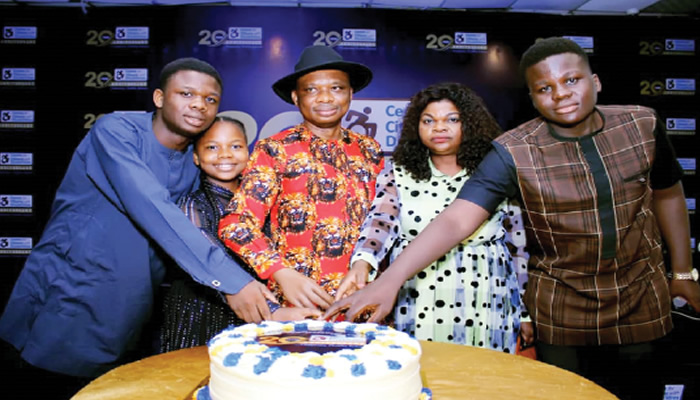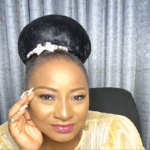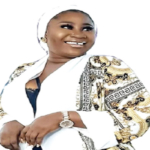
Disability inclusion activist and Executive Director, Centre for Citizens with Disability, David Anyaele, tells ALEXANDER OKERE why family values, mental and economic preparedness are important in parenting
When does a man qualify to be a father?
A man should qualify to be a father when he is mature physically, mentally, spiritually, and economically. These are very important factors in the sense that it takes the maturity of a man to father another person because that person will require a man’s leadership in those areas.
Do you think the responsibilities of a man as a father differ from one society to another? What are those responsibilities peculiar to Nigerian society?
In the Nigerian context, a father is required to provide leadership in the areas I mentioned. It is the responsibility of the father to provide for the family. What that means is that as a father, one is required to provide direction for the family. It is in the interest of the family that the father guides. Also, a father is the custodian of the historical antecedents of a family and the expectation of the family in the future.
What are those age-long perceptions about fatherhood that you think no longer fit into contemporary Nigerian society?
One of them is that the father must provide everything. Today, it is not tenable. In a family, the mother must make efforts to support the father in providing for the family. When children become adults, they ought to take steps to ensure that the needs of the family do not weigh their father down. One of the things responsible for the death of many men at an early age is that they bear the financial burden of every member of their families, which can be very heavy.
Did marriage for you come early, later than expected, or as you planned it?
It came later for me because I intended to marry at a particular age but situations beyond my control, economic instability and all that contributed to the postponement of my desire to get married. So, I can say that I didn’t get married when my peers did. I am from the Bende Local Government Area of Abia State and as such, we practise the age-grade system such that at a particular time, a particular age gets married. So, it is expected that a man gets married in the same period as his age-mates to have balance in life. But where the economic situation does not support that, many people postpone marriage.
As a Nigerian, what were the things you considered before you decided to get married, and why were they important to you?
One of the things I considered was economic stability. It plays a prominent role. A man does not only get married because he is physically, psychologically, spiritually or emotionally mature but because he takes responsibility; every responsibility has a cost, and that cost calls for money and that money must be available. So, I wanted to make sure I was able to feed myself and feed another person for one year without complaining. I also made sure that I was able to pay house rent without borrowing from another person. I also made sure that I was supporting my wife financially for her to be stable.
That was an important thing I paid attention to. I belong to the school of thought that a man must not depend on his wife to feed, he must pay the house rent and the children’s school fees. No matter how hard, I should be able to provide leadership in that direction. If my spouse wants to support me, she can. I don’t belong to the school of thought where a man sits down and a woman does everything from the beginning to the end.
How old were you when you had your first child?
I had my first son, who happens to be my first child, in my mid-30s. I am happy that God blessed us with a wonderful child. It didn’t come cheap for me; I put it that way because it is only God that gives a child. One cannot conclude that children will come when one gets married, not everybody has that privilege.
Being Igbo, were you particular about the gender of your first child?
I was not particular about gender. In fact, if I were to suggest, I would have desired a female child first. I am the first child and son of my parents and I know the difference between having a daughter as a first child and a son as a first child. If you have a son as a first child and the economic environment or situation does not support him, the likelihood of struggling with him is very high. But if you have a daughter first, the chances of supporting the father or mother in taking care of the siblings are high.
I also saw a pattern in my environment among my friends. I saw those who had a female as a first child prospering more than those who had a male as a first child. I don’t know what happened but that was what I saw. I felt that was a pattern, so I desired to have a daughter as my first child. However, God blessed me with two sons and a female, as my first, second, and third children, respectively.
Did anything change about you the day you saw your first child?
On the day my wife had our first child, I was the one that took her to the hospital. When we got there, I kept going out and coming in for one reason or the other. The experience was excruciating. I was there (in the delivery room) from the beginning to the end. It is one of the things I will not like to remember because of the agony my wife suffered. I was the first person that spoke to my first son. I had the honour of dedicating him to God and providing him with leadership. He was the only one whose birth I witnessed. I was away on a trip when my second son was born. Before my daughter was born, I took my wife to the hospital and was told to go home and return to the hospital. My sister-in-law had to take over. Before I returned to the hospital the next morning, I was told my daughter had been born.
Did you and your wife reach any agreement on the number of children to have?
There was nothing about agreeing on the number of children to have. As I said, it is only God that shows mercy and gives. Some desired many children and ended up having two. I was not concerned about the number of children I wanted.
Considering that you grew up in a society where having many children was regarded as a big achievement, why did you not continue that tradition?
Having many children depends on cultures and values. I come from a small family. My grandfather had a small family and I also believe in having a small family. What is life all about? Life is about one being happy, fulfilled and able to take care of his children through quality training. A man who has struggled financially in the past won’t want to have children he cannot train.
In many African traditions, naming is very important. How symbolic is it to you?
Yes, as an African, naming is important to me and my family. In my place, a name connects with an individual and resonates in a family. In my place, there are families with specific names. My children’s names show their identities and are symbolic.
What are the lessons about life that fatherhood has taught you?
One of the lessons is restraint. As a father, one is compelled to restrain himself in virtually everything because of the implication on his children. Fatherhood also makes one to perform certain responsibilities. For instance, a Christian man knows he owes his children the obligation to lead them in morning devotions and provide examples of how things should be done. There are certain actions a man should not take in public and private because his children are watching him.
For example, I told my children how I used to play in the neighbourhood when I was a child. After sharing that story, my second son started playing in the neighbourhood. I had to tell him that my time and his are not the same. I grew up in the South-East. Lagos is not that conducive for children to play.
What were the habits you had as a bachelor that disappeared as you started having kids?
I can’t remember having any habits different from the ones I have as a married man. I don’t smoke, drink or go out at night.
Fatherhood comes with peculiar challenges. Can you explain the ones you have faced or are still facing?
One of the major challenges is paying attention to the children, supervising them, and ensuring that what they are doing is in line with my expectation.
How do you handle such challenges?
Handling the challenges requires learning on the job as a father. One has to consider how he was trained by his parents or society and see how the children can get help in that area. One can also learn from his peers who are fathers. But the most important is reviewing one’s parenting pattern and helping the children avoid mistakes one made in the past.
As a man who has to work hard to fend for his family, how do you spend time with your children?
My case is challenging because I travel a lot. One of the ways I spend time with them is that I ensure that I take them to school when I am around. Also, I watch TV with them and discuss the programmes they watch. We also pray and sing together. That way, we interact and spend time together. When we go to church together, we have a series of discussions on the road about what we see, hear, and what people say. That way, we appreciate one another.
One of the values I learnt from my father is not eating outside. I don’t eat outside much. I eat at home when I am in town. I want my children to eat at home. No matter how good or sour the food is, it is our food. I also learnt how to pray with my children to help us bond.
Do you encourage your children to embrace rights activism as a career?
I won’t force careers on my children. They know what I am doing and see how I do it. I have the privilege to appear on the (TV) screen from time to time and sometimes, my children read about me in the newspaper. They also use it to form an opinion. Because of my peculiarity and the kind of work I do, they realise that it is important that we safeguard people’s rights, protect one another, and ensure that nobody is abused or undermined because of being privileged or underprivileged. They are thinking in that area but as I said, I won’t compel them to participate in rights activism because nobody forced me into it.
My father did not and my mother does not even know what I am talking about. It is a choice I made based on my experiences and interaction with my environment. I felt there was a gap and that gap stems from people in authority trying to undermine a group because they are underprivileged. So, we need to call the attention of the authorities to that, using the legal instrument, morality, and spirituality.
Have you been playing any role in your kids’ career choices or do you allow them to decide for themselves?
Yes, I do and that role is to expose to them what a career is all about and where they should expect to find themselves based on their career choices. The reason is that, depending on family background, environment and experiences, as a father I owe myself an obligation to guide my children in making choices that will not harm them in the future. There is a difference between having a particular talent and being interested in something and taking care of oneself for sustainable living. In a country of more than 133 million people living in poverty, you will agree with me that it is not the kind of country where children wake up to say they want to become whatever they want to be. That thing they want to be must be something that will sustain them, and put food on their table. It is not true that anything can fetch you money in Nigeria. So, one needs to be critical about their career choices.
I always encourage children to choose a career that has multidimensional opportunities – a career that can grant them access to any kind of profession – not a career that confines them to a particular place. A child must acquire skills and build a career that will expose them to many opportunities. However, the father needs to guide a child so that the child will not make mistakes.
Do you have concerns about the influence of social media on children in Nigeria?
The influence of social media on children in Nigeria is real in the sense that there are different kinds of skits on social media and if a child is not guided, they may harm themselves with these materials. Unfortunately, in this part of the world, many of the materials children are exposed to are not properly regulated. So, children have access to material not meant for them. It is a serious concern and I want to call on the authorities to find measures to ensure that children are well-protected from harmful materials on social media.
That is why a father needs to be close to his children and guide them to know the implication of some of those things. When a child does not have access to a father who can guide them, that child is very vulnerable. It is the responsibility of a father to understand. I see what my children post on social media. I call their attention to anyone that I am uncomfortable with and correct them. I equally tell them the implication so they will not feel that I am being strict.
Do you consider yourself a strict father?
I can’t say whether I am a strict father or not; only my children can say. All I know is that I will not allow them to do the wrong things. I will continue to provide guidance and leadership. I will make sure they do not put the name of the family in disrepute. I will guide them to prepare themselves to attract favour from God and man. If any of them does the wrong thing, I find ways to penalise them. If they do the right thing, I find ways to honour and motivate them to do better.
I correct my children when they err. It is not negotiable; everybody knows that at home. They can’t come before me and misbehave. I won’t tolerate it and they may not know the penalty. I may not use a cane but I know what to do. When kids are not corrected when they err, they see it as a pattern. They will not even take you seriously. My children know they should not misbehave because if it comes to my attention, forget it. They must be corrected consciously or unconsciously.
Also, I reward them when they do well and impress me from time to time. So, I do all I can to prevent my children from slipping from my hands. They are very vulnerable. The chances for them to fall into the wrong hands are high. It starts with the type of school they attend, which speaks volumes. It has nothing to do with the amount paid as school fees. It has to do with the values and principles guiding that institution. If you miss it at that level, it becomes a serious problem because you don’t know what the children are exposed to.
What are the things you regret not having as a child that you are grateful that your kids enjoy or will enjoy?
I did not have the privilege of going to church with my dad. My dad used to go to church alone in the morning. Now, I go to church with my children and return with them. Another thing I did not get as a child was the opportunity to travel to my village in the East for Christmas regularly but I do that now with my family. I enjoy travelling to the East with my children. Driving my children to the village and bringing them back is one of the greatest things I enjoy.
Considering your experience, what should unmarried Nigerian men know or do before venturing into fatherhood?
They should know that fatherhood is a responsibility. It is not for frivolity. It is something they must devote their emotional, spiritual, physical and economic resources to ensure that they create a happy home. Being mature in age, and having wealth, do not make a man qualified to be a father. Fatherhood is about dedication. Anyone who cannot tolerate other people’s weaknesses should not venture into fatherhood because they will end up hurting themselves.





